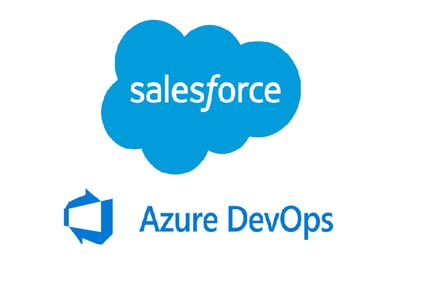Yes. Salesforce can integrate with Azure DevOps. However, there are two main use cases that are often confused. The first scenario is developer and engineering focused, and the second, is customer service and business focused.
 1. Developer/Engineering Use Case
1. Developer/Engineering Use Case
Azure DevOps is a suite of tools for software development, including version control, build and release management, and project management.
Salesforce can be integrated with Azure DevOps using the Azure Pipelines. Pipelines automates the release management process for managed and unmanaged packages. Pipelines provide the continuous integration and delivery service that automates the building, testing, and deployment of applications. In other words, Azure DevOps is used for CI/CD.
Similarly, using the Salesforce CLI plugin for Azure Pipelines, developers can deploy Salesforce metadata and Apex code to their Salesforce orgs as part of their automated build and release pipeline. This integration allows developers to manage their Salesforce code alongside their other applications, providing a seamless experience for managing and deploying code across different systems.
In addition to Azure DevOps and Pipelines, Salesforce can also integrate with other Azure services, for example, Azure Active Directory, Azure Data Factory, and Azure Logic Apps, among many more. While these are all viable integrations, they are less common and specific to other use cases.
2. Customer Service (Support/Helpdesk) Use Case
In this case, support and dev teams are seeking to solve a process or flow problem. For companies that support software, albeit packaged or custom, they usually have a customer service desk that provides support to customers and end users. Under ideal circumstances, when customers report issues, cases or tickets are opened and quickly closed by the support desk. A common example would be password resets. Other times, the problem may be more complex and require more technical or engineering skills to solve. In this instance, customers could be reporting an error or software bug, both of which usually require development to fix.
Here lies the problem. The information (i.e., problem details) are captured in the case. This may include a problem description and a screenshot illustrating the issue. While the support team diligently gathered the relevant information, all the details required to troubleshoot and solve the problem, reside in customer support's primary line-of-business (LoB) application, in this case Salesforce CRM. In contrast, engineering has their own LoB or work management system (i.e., Azure DevOps). The problem is, for engineering to take action, the case formation has to get to Azure DevOps so that the dev team can plan their work, collaborate and fix the issue. Without programmatic integration, this is usually only achieved through manual data entry (re-entry) and managed with cumbersome spreadsheets.
The ultimate solution is to automate the escalation of cases from customer facing support teams using Salesforce, to development or engineering teams using Azure DevOps. This is ideally achieved through bi-directional integration.
At Quantum Whisper, our sole mission is to solve for this problem. Our team experienced this exact problem firsthand for many years. We were so frustrated we founded the company to solve for it. The result was a packaged and purpose built Salesforce & Azure DevOps integration connector (download connector PDF) that seamlessly integrates to connect support and development teams.
As you can see, the respective scenarios, solve very different problems. While they both provide some form of integration, the use cases, stakeholders, and available solutions are very different.




